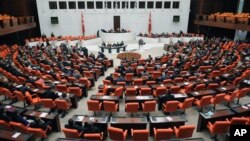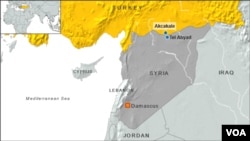ISTANBUL/WASHINGTON — The Turkish parliament has approved a government motion to authorize further military operations outside the country's borders, after striking Syrian targets in response to a deadly cross-border mortar attack.
The parliament easily passed a motion sanctioning military intervention into Syria, a constitutional requirement for the government. The move follows the deaths of five Turkish citizens by artillery fire from Syria on Wednesday.
Deputy Prime Minister Besir Atalay said the one-year measure is not a declaration of war, but intended as a deterrent against aggressive action by Syria.
The Turkish army fired on Syrian army positions in response, and according to local reports launched further attacks Thursday on Syrian military installations.
Atalay said Syria has taken responsibility and formally apologized for the deaths of the five Turkish civilians, and reassured the United Nations that "such an incident will not occur again."
The opposition Syrian Observatory for Human Rights said Ankara's retaliatory artillery strikes killed three Syrian soldiers near the border town of Tel Abyad. Syrian state media has not reported any casualties.
Local news reports said at least 10 separate attacks early Thursday targeted the area that Turkish forces identified as the source of the Syrian mortars.
U.N. urges restraint
U.N. Secretary-General Ban Ki-moon urged Turkey and Syria Thursday to exercise "maximum restraint" amid the rising tensions. Ban expressed "alarm" at the situation along the Syrian-Turkish border and called on both sides to "exert all efforts to move toward a political solution."
Speaking in New York, Syria's U.N. envoy Bashar Jaafari urged "states and governments" to act wisely and rationally after the attack.
Russia Thursday blocked the adoption of a draft U.N. statement condemning the deadly Syrian mortar attack and proposed a weaker text that would call for "restraint" on the border without referring to breaches of international law.
Retired Turkish military leader Haldun Solmazturk said the border lines between Syria and Turkey are often blurred and Syria's on-going conflict sometimes spills across the lines.
"What we call a border in this region is just a simple fence going through neighborhoods, villages," he said. "Similar accidents can happen anytime despite the fact that Syria will do its best to avoid [them]."
The Turkish army is sending reinforcements to the Syria border.
Ankara has increased forces on the 900-kilometer frontier since a Turkish warplane was shot down in June by Syrian anti-aircraft fire.
No political consensus in Turkey
But there is not a political consensus in Turkey for a large-scale military action against Syria.
The main opposition Republican People's Party voted against the government motion in parliament, and according to opinion polls the Turkish public is also strongly opposed.
Political scientist Cengiz Aktar, of Istanbul's Bahcesehir University, said in a few hours there has been economic fallout from the cross-border volleys.
"It already had quite a negative impact on the equity and foreign markets," he said. "Turkey is entering quite a difficult period economically speaking and I do not think they will want to add more expenditure to their already very strained budgets."
The Turkish government has in the past said it would not intervene unilaterally in Syria. But it is finding little international support for intervention from the United Nations or NATO. Following Syria's shelling, Turkey's allies condemned Syria and called for restraint.
Turkish analyst Sinan Ulgen said Ankara has been generally disappointed by international response to the Syrian crisis.
"Turkey feels it has been left alone to deal with crisis on Syria," he said. "The international community, despite having engaged in the rhetoric of the responsibility to protect, did not live up to the bargain."
Turkey's military stretched
Analysts say Turkish forces may not be able to carry out a full-scale military operation against Syria on its own.
While its forces are much larger and more modernized than Syrian forces, the Turkish military is battling Kurdish insurgents and also has jailed hundreds of high-level officers.
More than 300 army officers were convicted last month of conspiring against the government.
"So this could be the worst set of conditions under which [to go] to war with Syria," said former military leader Solmazturk.
In Syria on Thursday, opposition activists said Syrian rebels killed 21 elite Republican Guards in Damascus province in an ambush on an army minibus.
Separately, troops loyal to President Bashar al-Assad shelled the northern city of Aleppo, a day after a series of explosions killed 48 people there.
The parliament easily passed a motion sanctioning military intervention into Syria, a constitutional requirement for the government. The move follows the deaths of five Turkish citizens by artillery fire from Syria on Wednesday.
Deputy Prime Minister Besir Atalay said the one-year measure is not a declaration of war, but intended as a deterrent against aggressive action by Syria.
The Turkish army fired on Syrian army positions in response, and according to local reports launched further attacks Thursday on Syrian military installations.
Atalay said Syria has taken responsibility and formally apologized for the deaths of the five Turkish civilians, and reassured the United Nations that "such an incident will not occur again."
The opposition Syrian Observatory for Human Rights said Ankara's retaliatory artillery strikes killed three Syrian soldiers near the border town of Tel Abyad. Syrian state media has not reported any casualties.
Local news reports said at least 10 separate attacks early Thursday targeted the area that Turkish forces identified as the source of the Syrian mortars.
U.N. urges restraint
U.N. Secretary-General Ban Ki-moon urged Turkey and Syria Thursday to exercise "maximum restraint" amid the rising tensions. Ban expressed "alarm" at the situation along the Syrian-Turkish border and called on both sides to "exert all efforts to move toward a political solution."
Speaking in New York, Syria's U.N. envoy Bashar Jaafari urged "states and governments" to act wisely and rationally after the attack.
Russia Thursday blocked the adoption of a draft U.N. statement condemning the deadly Syrian mortar attack and proposed a weaker text that would call for "restraint" on the border without referring to breaches of international law.
Retired Turkish military leader Haldun Solmazturk said the border lines between Syria and Turkey are often blurred and Syria's on-going conflict sometimes spills across the lines.
"What we call a border in this region is just a simple fence going through neighborhoods, villages," he said. "Similar accidents can happen anytime despite the fact that Syria will do its best to avoid [them]."
The Turkish army is sending reinforcements to the Syria border.
Ankara has increased forces on the 900-kilometer frontier since a Turkish warplane was shot down in June by Syrian anti-aircraft fire.
No political consensus in Turkey
But there is not a political consensus in Turkey for a large-scale military action against Syria.
The main opposition Republican People's Party voted against the government motion in parliament, and according to opinion polls the Turkish public is also strongly opposed.
Political scientist Cengiz Aktar, of Istanbul's Bahcesehir University, said in a few hours there has been economic fallout from the cross-border volleys.
"It already had quite a negative impact on the equity and foreign markets," he said. "Turkey is entering quite a difficult period economically speaking and I do not think they will want to add more expenditure to their already very strained budgets."
The Turkish government has in the past said it would not intervene unilaterally in Syria. But it is finding little international support for intervention from the United Nations or NATO. Following Syria's shelling, Turkey's allies condemned Syria and called for restraint.
Turkish analyst Sinan Ulgen said Ankara has been generally disappointed by international response to the Syrian crisis.
"Turkey feels it has been left alone to deal with crisis on Syria," he said. "The international community, despite having engaged in the rhetoric of the responsibility to protect, did not live up to the bargain."
Turkey's military stretched
Analysts say Turkish forces may not be able to carry out a full-scale military operation against Syria on its own.
While its forces are much larger and more modernized than Syrian forces, the Turkish military is battling Kurdish insurgents and also has jailed hundreds of high-level officers.
More than 300 army officers were convicted last month of conspiring against the government.
"So this could be the worst set of conditions under which [to go] to war with Syria," said former military leader Solmazturk.
In Syria on Thursday, opposition activists said Syrian rebels killed 21 elite Republican Guards in Damascus province in an ambush on an army minibus.
Separately, troops loyal to President Bashar al-Assad shelled the northern city of Aleppo, a day after a series of explosions killed 48 people there.






